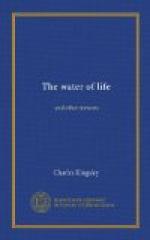I am well aware that many will differ from me; that many men and many women—holy, devoted, spending their lives in noble and unselfish labours—persons whose shoes’ latchet I am not worthy to unloose— take a far darker view of the state of this metropolis. But the fact is, that they are naturally brought in contact chiefly with its darker side. Their first duty is to seek out cases of misery: and even if they do not, the miserable will, of their own accord, come to them. It is their first duty too—if they be clergymen—to rebuke, and if possible, to cure, open vice, open heathendom, as well as to relieve present want and wretchedness: and may God’s blessing be on all who do that work. But in doing it they are dealing daily—and ought to deal, and must deal—with the exceptional, and not with the normal; with cases of palpable and shocking disease, and not with cases of at least seeming health. They see that, into London, as into a vast sewer, gravitates yearly all manner of vice, ignorance, weakness, poverty: but they are apt to forget, at times—and God knows I do not blame them for it in the least—that there gravitates into London, not as into a sewer, but as into a wholesome and fruitful garden, a far greater amount of health, strength, intellect, honesty, industry, virtue, which makes London; which composes, I verily believe, four-fifths of the population of London. For if it did not, as I have said already, London would decay and die, and not grow and live.
Am I denying the spiritual destitution of this metropolis? Am I arguing against the necessity of the Bishop of London’s Fund? Am I trying to cool your generosity towards it? Am I raising against it the text—’They that be whole need not a physician, but they that are sick?’ Am I trying to prove that the sick are fewer than was fancied, the healthy more numerous; and, therefore, the physician less needed? Would to heaven that I dare so do. Would to heaven that I could prove this fund unnecessary and superfluous. But instead thereof, I fear that I must say—that the average of that health, strength, intellect, honesty, industry, virtue, which makes London—that the average of all that, I verily believe, is to be counted (though it knows it not) among the sick, and not among the sound. It is sick, over and above those personal sins which are common to all classes; it is sick of a great social disease; of a disease which is very dangerous for the nation to which we belong; which will increase more and more, and become more and more dangerous, unless it is stopped wholesale, by some such wholesale measure as this. That disease is (paradoxical as it may seem) Want of Civilization; Barbarism, which is the child of ungodliness. And that can, I verily believe again, be cured only (as far as we in the nineteenth century have discovered) by an extension of the parochial system.




